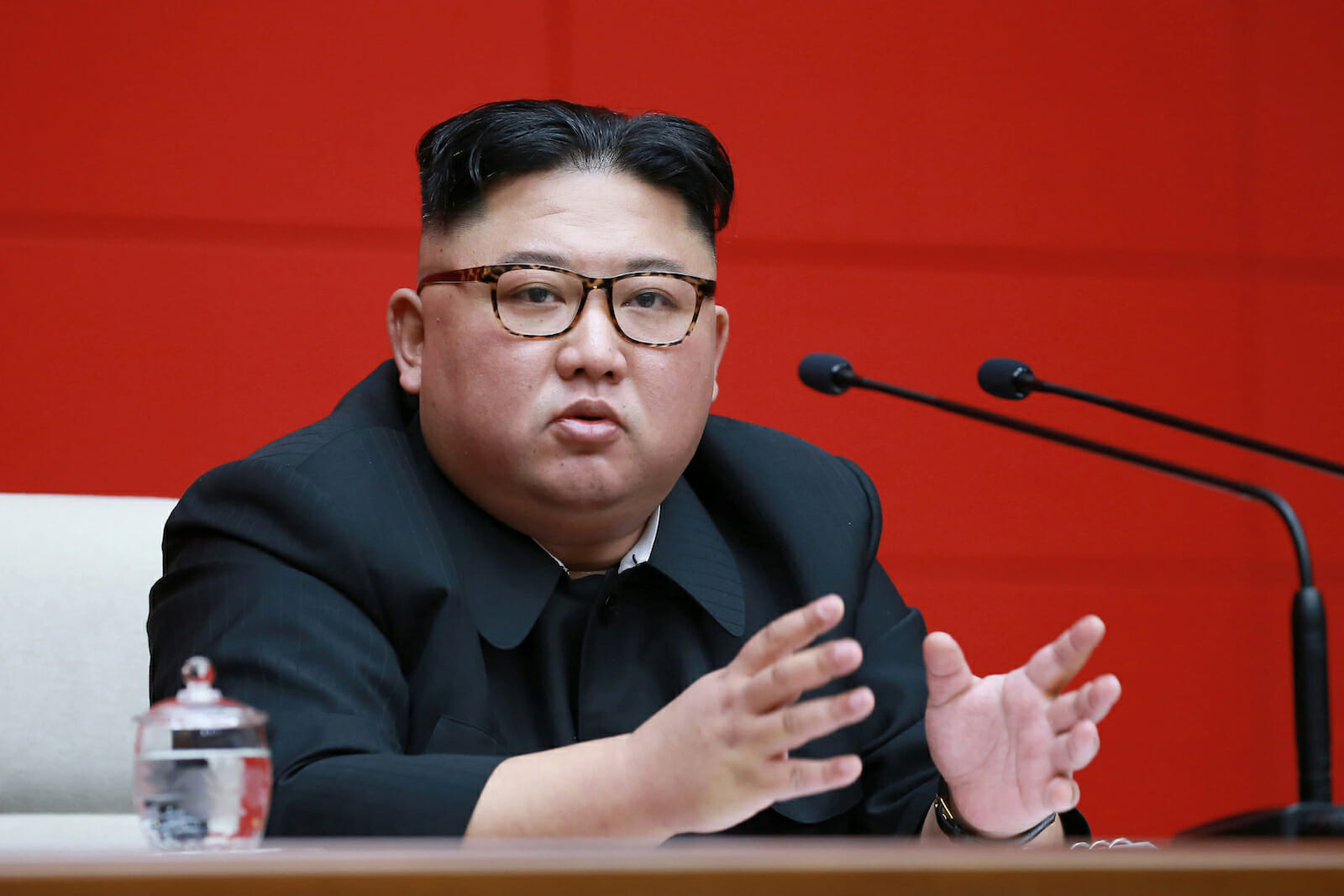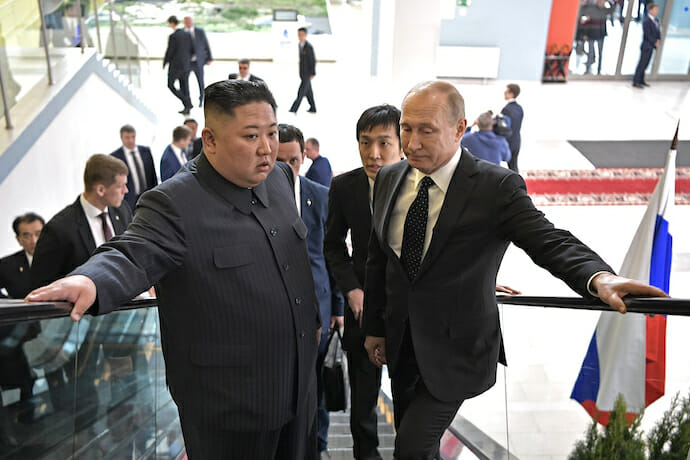
Russia’s New Role in the Korean Peninsula
North Korea’s Kim Jong-Un arrived in Vladivostok on Wednesday to meet with Russia’s President Vladimir Putin for the first time since the North Korean leader came to power in late 2011. As expected, the first summit between Putin and Kim Jong-Un has not resulted in signing documents or agreements, but it opened up the possibility of future high-level engagement between the two neighbours and former allies. It was an important moment for both North Korea and Russia to demonstrate their positions on the global stage. For Kim Jong-Un, as diplomacy with the US seems to have deadlocked following the failure of the Hanoi summit, it was an opportunity to look at the other cards that he has to play, and for Russia, it was an important event to demonstrate its willingness to play a major role in the stability of the Korean Peninsula. As Putin puts it “Russia seeks to proactively facilitate progress toward a political and diplomatic settlement” and “stay involved in efforts to ease tensions on the peninsula and strengthen security in Northeast Asia.”
Putin opened up the discussion by praising Kim Jong-Un’s initiative, which according to his words “increased the stability of the Korean Peninsula” and describing the North Korean leader as “an interesting and substantive interlocutor.” The two leaders had a one-on-one meeting, which emphasized the “history of the interstate relations and the prospect for developing bilateral ties” between the two countries that were established seven decades. The two countries were close partners during the Cold War and the Korean War and signed a bilateral treaty on friendship, mutual assistance, and cooperation after the war. Moscow also played an important role during the early stages of North Korea’s nuclear program by providing an NTI-2000 nuclear research reactor in the early 1960s. It continued to expand the reactor’s usage of enriched uranium from 10 percent to more than 20 (highly enriched uranium) during following decades.
For North Korea, addressing the fate of more than 10,000 of its workers that currently operate in Russia was important for the current Russia-North Korea discussion as the country is looking for sanctions relief. The UN Security Council is expecting Russia to expel all North Korean workers out of its territory by the end of the year as Resolution 2397 states. The expectation of Pyongyang is for the Kremlin to reconsider this position, which could push Moscow into a sanctions violation. In a press conference after the meeting, Putin addressed this issue by calling it a “humanitarian issue,” while not stating how Russia will address the UN Security Council concern on this subject. If Moscow decides to expel North Korean workers from Russia, this would hurt the North Korean economy, as it is believed that these workers, formally known as ‘guest workers’ do serve as a significant revenue source for North Korea.

On the question of denuclearization, Russia’s definition of it as President Putin mentioned in the press conference was important. It sounded more realistic than the US option of a “complete, verifiable, irreversible denuclearization of the Korean Peninsula.” According to Putin’s definition of denuclearization, he argued that “it is disarmament to a certain extent” with “security guarantees” that needed to be addressed. However, as a Russian scholar Georgy Toloraya argued, what is possible is limiting North Korea’s intercontinental ballistic missiles thus curtailing the North Korean capability to threaten the US’. This idea emphasizes an argument that was earlier made by Xin Qiang of the Fudan University, who introduced the idea of “conditional, reciprocal, incremental denuclearization,” which is more realistic and feasible than either the “final, fully, verifiable denuclearization” or “complete, verifiable, irreversible denuclearization” proposals that the US is seeking to achieve.
To achieve this objective (denuclearization), Russia along with China have embraced the idea of ‘freeze-for-freeze’ – freeze North Korea’s nuclear and missile testing and in return, both the US and South Korea should freeze their joint military exercises. However, the problem with this approach is that it is only a short-term solution and it does not help a lot as a confidence-building measure. Also, if the US and North Korea fail to make progress on talks regarding the nuclear issue, it is a step that could be easily reversed.
But there is a more realistic approach and according to Russia’s foreign ministry, this has to “address the overall military and political tensions,” and then discuss the possibility of having a denuclearization of the Korean Peninsula – not unilateral disarmament by North Korea under some ‘security assurances.’ But this approach challenges US interests in the Asia-Pacific in general and for that reason, it could be unacceptable for Washington. After all, it could raise a question of America’s commitment to its allies in Asia and may threaten its position vis-à-vis a rising China. But as Russia supports the denuclearization of the peninsula as a principle, it also has some empathy for North Korea’s quest for nuclear weapons by emphasizing the security environment that North Korea is in and the poor bilateral ties between the US and North Korea. While the position is completely in contrast to the US position, Putin emphasized that the US and Russian interests in the Korean peninsula “coincides in some respect” including an opposition on the global proliferation of weapons of mass destruction.
The talks between North Korea and Russia crystalized elements of Russia’s Korea policy. First, by playing a more ambiguous role regarding North Korean labor in Russia’s territory, Moscow seems to raise the prospect of sanctions relief through a step-by-step process. This will need to be addressed in the United Nation’s Security Council and seems that as long as the current US policy is in place, Washington would veto any sanctions relief without any substantive steps by Pyongyang on disarmament. Second, hosting Kim Jong-Un before Putin’s visit to China sends another message to the US about the new role that Moscow is seeking to play in Asian affairs as part of the Kremlin’s ambitious Eurasia strategy as current US-Russia relations on the cold. Third, as the new round of bilateral détente with North Korea (US-North Korea talks and China-North Korea dialogue) seems to sideline Russia’s role in the Korean Peninsula, the Kremlin is trying to reassert a new role in the region by signaling the importance of inviting other important actors to the negotiating table (Russia in particular). So although the Russia-North Korea summit has not produced new and tangible results, it seems that both Kim Jong-Un and Putin achieved their near-term objective – namely for Putin to reassert a new role for Russia in the Korean Peninsula, and for Kim Jong-Un to test the alternatives following the Hanoi summit, where he did not succeed in securing a deal with the US.

